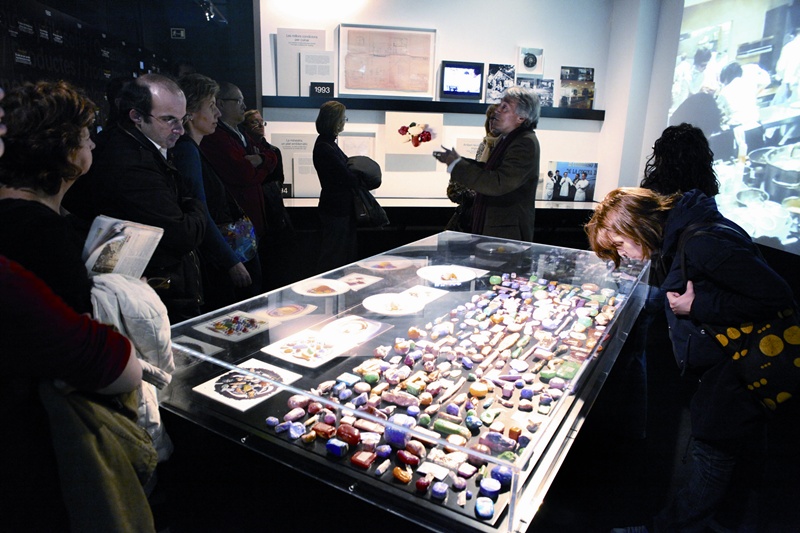
© BarcelonaActua
Free guided tour, courtesy of BarcelonaActua, of the exhibition “Ferran Adrià and El Bulli: Risk, Freedom and Creativity”, at the Palau Robert until February 2013
If there’s one benefit of wiki communities, it’s that they can start up with a tiny budget and grow spectacularly in a very short time. It’s all about having a good idea and carrying it through at the right moment. Economist Laia Serrano (born in Barcelona in 1973) had one: to set up a solidarity network in which the people of Barcelona could give their time, work, activities and objects they no longer used.
We’ve met up with her to hear her story. “It all started in late December 2010 when, on a RAC1 radio programme, the show’s host Jordi Basté posed the question: what would we not be doing that Christmas because of the recession?” says Serrano. Lots of people rang in with moving stories about losing their jobs, about the lack of presents and about loneliness, until one woman rang offering someone her home. That made me think that we all have a latent sense of solidarity and when it’s made easy for us, we bring it out. I could see that it would be a good idea to connect the new enlightened poor – in other words, all of us – through new technologies.”
And that’s how BarcelonaActua came about, officially launched on 30 October 2011. From the outset, Laia Serrano (who spent 11 years working in Codorniu’s marketing department and four months as a volunteer in Cali, Colombia) was very clear that the keystone to all this was to link up the world of solidarity with the world of communications. Thus, she built the BarcelonaActua platform on three pillars: putting people with needs and people with something to offer in touch with each other; creating a community that is not only virtual but also face-to-face; and raising awareness of our social reality.
Since then, the platform has been creating contacts between people who have basic needs that must be covered, charitable people and lonely people, and every city has many of those. “We’re all in the same boat and we can all go through any of these three situations at different times in our lives. There are no beneficiaries or volunteers; whoever gives now may receive tomorrow and vice versa,” explains Serrano. And she has plenty of examples to illustrate this: “One girl donated a piano that ended up in a school in the Besòs district; it was really touching to see how happy the children were to get it. We were also contacted by a guy who helped out with homeless people and he got 42 sleeping bags and 15 blankets in record time, just as the cold snap arrived. People really want to help, but they must be asked for very specific things and it needs to be made easy for them.”
Laia Serrano knows that the key is to generate trust, and this is one of the reasons behind the face-to-face meetings, such as the ones held in the Raval or when members met up to swap clothing in the garage of one of the BarcelonaActua activists, a widow who was alone and looking to meet other ladies like herself. “It has changed her life and now they’re a tireless group of women,” says Serrano. “I believe that proximity is essential for shifting the virtual world into the real world. That’s why we’ve restricted ourselves to Barcelona. We’ve been in touch with the people at the Banc del Temps [Time Bank], who are even more on top of the issue of proximity because they are organised by district, so that way we can also spread their initiatives.”
The website is very user-friendly and it takes just a few seconds to sign up. You then have to select your area of interest: work, leisure, household goods, clothing, teaching, company, advice, arts, electronics and others. Serrano believes that the arts area is very important because it helps members to get involved with a range of activities that they themselves suggest. The day this article was being penned, Agustí had discovered an Irish pub near the Sagrada Família where they had live music and he suggested a visit. Within a few days, he had willing companions. Meanwhile, Susanna was offering tablets to strengthen fingernails and hair “to someone who really needs it” and Jordi proposed swapping clothes for shoes, while Xavier looked for a cheap rental flat because he was out of a job.
Bearing all this in mind, of course, there is one question that must be asked of Laia Serrano: how do you earn a living? “I don’t. We’re in the initial stages. We’ve made it. And now we have to go and get funding, with all these successful experiences that we have behind us. There are Catalan companies out there that have strong links with Barcelona and that want to demonstrate their social responsibility.” The platform’s slogan is Tots per tots a la ciutat (All for all in the city). There’s no doubt that through this network, this “all” that we all wish for is gradually becoming a reality.




Hola.. me gustaria a donde puede dirigirme para poder contactos con vosotros.. me parece un gran proyecto me gusrataria participar..atentemente. c.,capdet